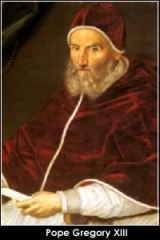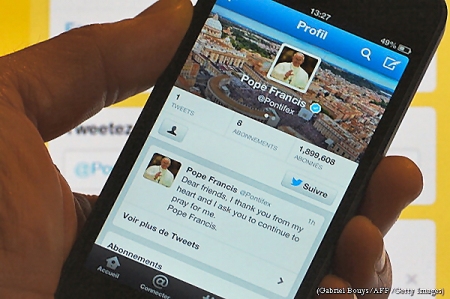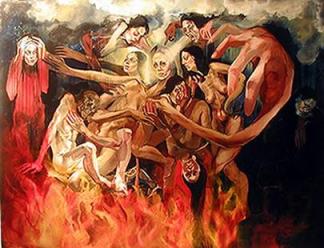The Vatican “jumped” on the heretical bandwagon in 2013 by offering “indulgences” to reduce time in “purgatory”, to those who follow Pope Francis on “Twitter” during World Youth Day.
Also in 2019 Pope Francis has granted a "plenary indulgence" for those taking partat the World Meeting of Families in August. Even those following events on TV and radio could achieve a partial
indulgence as long as they recited the Our Father, the Creed and other
devout prayers.
The Sacred Apostolic Penitentiary, the Vatican body dealing with
forgiveness of sins, said pilgrims would have to attend confession and
Mass, pray for the Pope's intentions and participate in some function
during the five-day event.
is said by many protestants.As foolish as this sounds to “intelligent” people, we must wonder if Catholics will ever “wake up” and realize their religion teaches a “false and fatal” gospel that leads them on the broad “road to destruction?”
How many more “blatantly” false teachings must come out of the Vatican before Catholics realize they have been “deceived” about life’s most critical issue, the “salvation of their soul?”
Catholics, who believe a “purifying” fire will purge away their sins, are “deluded” victims of a “fatal” fabrication.
The “diabolical” invention of a place for the purification of sins called “Purgatory” is not only a flagrant “denial” of the sufficiency of Jesus Christ, but also a “blasphemous” rejection of his precious blood as the only “purification” for sin. furthermore it continues thinking in the line that God would be a horrible tirrant wishing or loving to have His children tortured in hellfire or purgatory fire.
 The “concept” of Purgatory became a Catholic “doctrine” around 600 C.E. due to the “fanaticism” of Pope Gregory the Great.
The “concept” of Purgatory became a Catholic “doctrine” around 600 C.E. due to the “fanaticism” of Pope Gregory the Great.
He “developed” the doctrine through “visions” of a purifying fire.
According to the Catholic Encyclopedia, Pope Gregory said Catholics
“will expiate their faults by purgatorial flames,”
and
“the pain is more intolerable than anyone can suffer in this life.”
Centuries later, at the Council of Florence in 1431, Purgatory was pronounced an “infallible dogma.”
Over the centuries, “billions” of dollars have been paid to Roman Catholic priests to obtain “relief” from sufferings in Purgatory’s fire.
The Catholic clergy has taught that purchasing “indulgences, novenas and Mass cards” can shorten the period of “suffering” in Purgatory.
There have been Catholics who have “willed” their entire “estates” to their religion so that “perpetual masses” could be offered for them “after” they die.
It is no “wonder” that the Catholic religion has become the “richest” institution in the world.
The “buying and selling” of God’s forgiveness has been a very “lucrative” business for the Vatican.
In 2014, the pope mentioned hell when calling the Mafia to conversion.
In 2016, he said that people who do not open their hearts to Christ will
end up condemning themselves to hell. The same year, he referred to
hell as "the truth" and described it as being
In 2018 social media went crazy with reports that Pope Francis had denied the existence of hell."far away from the Lord for eternity."
The most extensive papal explanation of hell came in
response to a 2015 question from a female scout who asked,
The pope spoke of a very proud angel who was envious of God, reports Catholic News Service.
When we close our hearts and tell the world to go to hell, we are in fact choosing hell for ourselves. Hell is the absence of love, companionship, communion. We are not sent there; we choose it.
God did not create hell; we did.
"If God forgives everyone, why does hell exist?"Francis acknowledged that this was a "good and difficult question."
The pope spoke of a very proud angel who was envious of God, reports Catholic News Service.
"He wanted God's place,"said Francis.
"And God wanted to forgive him, but he said, 'I don't need your forgiveness. I am good enough!'"
"This is hell,"explained the pope.
"It is telling God, 'You take care of yourself because I'll take care of myself.' They don't send you to hell, you go there because you choose to be there. Hell is wanting to be distant from God because I do not want God's love. This is hell."Most contemporary theologians would agree with the pope. Hell is not about fire and brimstone; it is about our freedom to say no to God, our freedom to reject love and choose loneliness. If you believe in freedom, you have to believe in hell.
When we close our hearts and tell the world to go to hell, we are in fact choosing hell for ourselves. Hell is the absence of love, companionship, communion. We are not sent there; we choose it.
God did not create hell; we did.
++
Find also to read
- Pope Francis grants indulgences for Dublin participants
- Pope to grant indulgences at Dublin World Meeting of Families
- Pope Francis Grants Indulgence to the Faithful during the 50th Anniversary of the Diocese of St. Petersburg











